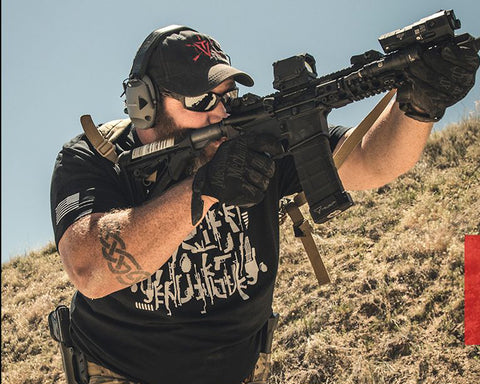What You Need To Know
- ✔ You don't have to make a down payment, but it will save you money on your VA loan
- ✔ Not all sellers will agree to this, but having the seller pay your closing costs will save you a lot of money
- ✔ Refinancing is a great way to save, and the VA won't let you do so unless it makes financial sense
Ah, the VA. Just like any government entity, you can always find some type of waiver or exemption to get you through the gate. This can cause many headaches if you don’t know about them upfront, especially dealing with any department within the Great. Almighty. VA. There’s so much detail involved it can feel like someone took away your birthday, stole your puppy, ate your lunch out of the company refrigerator, poured salt in your wounds, and then kicked you into a 20 ft. pool, knowing you can’t swim. On the bright side, there’s a VA funding fee exemption. So, keep reading to find out what a VA funding fee exemption is. Because you might still feel like you’re drowning but stand up, you’re in the shallow end.
VA Home Loans
Before we get into some of the more intricate details of the VA, let’s talk about VA Home Loans as a whole. Such as who does and doesn’t qualify. It’s not as simple as enlisting into one of the Armed Forces Components. You have to meet certain requirements. For instance, if you served four years but got out on less than honorable terms, you do not qualify for a VA Home Loan. If you served less than 90 days, you don’t qualify for the VA Home Loan either, unless you were discharged for a service-connected disability.
Who Qualifies for a VA Home Loan?
Current or Veteran members of any US Military components serving or released on anything not titled “less than honorable” who have served at least 90-days or served less than 90-days due to a service-connected disability qualify. Surviving spouses also qualify if your spouse died during service or due to their service-connected disability—spouses of service members who are MIA or a POW qualify. If you are a surviving spouse who remarried before December 6, 2003 and applied for a home loan after December 15, 2004, your application will be denied, no exceptions, no waiver. Also, you have to be at least 57-years-old.
The list of who qualifies and how they qualify is actually much more extensive than the above. But it gives you a general idea of the qualifications. There are entire sections dedicated to qualifying members who served during peacetime, during war, those who have already separated (for both officers and enlisted members—yes, there’s a difference), Active Duty personnel, select Reserve and National Guard personnel, spouses. Of course, there’s a section titled “Other Eligible Beneficiaries.” If you fall into one of those categories, your best bet is to visit the VA’s website and look up your component, status, and service dates, and read that section. Otherwise, this article would look more like a novel. And we all know you’re probably not going to read past the section titled “how to get free cake for a lifetime,” let alone a novel. I’m kidding; there’s no free cake. But, you should keep reading, because there’s always a chance we’re lying.
Are you looking to build a new home? Check out our blog on the VA Construction Loan before you start.
eBenefits
If you’re ready to prove you qualify for a VA Home Loan, you can do so through eBenefits. If you haven’t heard of eBenefits, it’s basically your life source to the military and all your benefits once you’ve separated, including filing for VA Disability. You’ll use eBenefits to get your CEO (Certificate of Eligibility), which shows the lender that you actually qualify for a VA Home Loan. You can also apply for your CEO via mail or through your lender, but ebenefits is the fastest way to get that done. After all, that’s done, then you can start worrying about all the fees you’re going to pay or not pay, such as the VA Funding Fee.
What is a VA Funding Fee?
A VA Funding Fee is intended to help reduce the loan’s cost to taxpayers. Now, you might be thinking, what do taxpayers have to do with my loan cost? Last I checked, no one is paying for my loan.
This is true. Taxpayers aren’t dishing out any money to help you with your loan process. The VA Funding Fee is meant to keep that from happening. By the VA not requiring taxpayers to dig a little deeper into their pockets, they can assure future homebuyers that VA Home Loans will be around for them too.
How much is a VA Funding Fee?
The VA Funding Fee isn’t just one flat rate, although that would probably make things a lot easier for those of us who have mathematics disorder—yes, that’s a real diagnosable disorder. There is, however, a flat percentage you owe at closing, and if you know how to use a calculator, there just might be hope for you after all. Or, just use this funding fee calculator found here.
In 2011, the VA updated its funding fee table, which you can see here. Based on your military status, how much you put down, and if it’s your first VA Home loan or a subsequent loan—which increases your funding fee—will determine the percentage you’ll have to pay.
If you served as a regular, active duty service member and you put no money down on your first VA home loan, you’ll pay 2.15%, or 3.3%, if you’re applying for subsequent use. As a Guard or Reserve member, you’ll pay 2.4% or 3.3%.
The VA Funding Fee doesn’t have to be up to 3.3% of your loan amount, though, if you’re willing to put some money down. While we understand, in most cases, there’s no required down payment with a VA Home Loan, there is an advantage to putting down as little as 5%. If you pay 5%, regular military members will only pay 1.5% of the home loan, no matter how many times they’ve used a VA Home Loan. Guard and Reserve members will only pay 1.75%. If you can swing 10% or more, as a regular military member, you only pay 1.25% and 1.5% as a Guard or Reserve member.
Do I have to pay the VA Funding Fee?
Now, let’s get into the good stuff. Do you have to pay the VA Funding Fee? During normal circumstances, the answer is yes. Now, this may not seem like a good thing, but refer yourself to the tax deduction section below if you need something to make you feel a little better.
If, however, you don’t fall into the normal circumstances, maybe it’s because you have a VA service-connected disability, causing your exemption of the funding fee. If you’re a surviving spouse of a veteran who died during service or as a result of their service-connected disability, you’re also exempt from paying this fee.
While it’s unfortunate that anyone leaves the service holding onto a disability rating, it does get you out of paying a VA Funding Fee.
For example, say you purchase a home for $280,000. If you met all the qualifications, and for the purpose of this example, served as a regular active duty member of the military; as a first-time utilizer of a VA Home Loan, you’re going to pay 2.15% if you don’t put any money down. That’s $6,020! A Guard or Reserve member will have to fork out $9,240! Now imagine you’re paying for a more expensive home; your VA Funding Fee may break the bank. Of course, you have the option of financing the fee or paying in cash; either way, you’re going to have to pay it at closing. But, if you’re a veteran receiving disability compensation, you don’t have to pay anything.
Disability Percentage Needed to Waive a VA Funding Fee
When it comes time to take advantage of all the opportunities that come with having a VA disability, the rate seems to float around 30% service-connected. However, a waived VA Funding Fee-only requires the veteran to have a 10% service-connected disability, which makes a $0 down, $0 funding fee home loan attainably realistic.
Is the VA Funding Fee Tax Deductible?
Tax season is like Christmas. Unfortunately, depending on which side of the list you’re on, that can be either a good or bad thing. The IRS is like Santa, and they’re either bringing you a lump of coal in the form of a bill or what you’ve been hoping for all year, a big fat return check, paid in full by the US Government. Some years, however, you might have to fork out even more cash than you anticipated, and Santa seems more like the Grim Reaper, here to take your soul and sell it on the black market. Luckily, if you had to pay a funding fee when purchasing a home with your VA Home Loan, your funding fee is most likely tax-deductible. Some factors could disqualify you, but for now, let’s focus on the nice side of the Christmas List.
If you qualify for the VA Funding Fee Tax Deduction, you have met the following qualifications:
You purchased your home between January 1 and December 31 of the year you’re filing for.
You have a gross income of less than $100,000
The house you purchased is listed as your primary home.
If none of the above applies to you, still talk to your tax preparer so they can look at other deductible options, such as points.
Other VA Home Loan Fees
Fees, they’re everywhere. If you don’t believe us, try and pay a loan off early, use a credit card to pay your electric bill or for a new drivers’ license instead of cash, or even try keeping a checking account open. The ways companies find to make you pay them just a little more is astounding. I mean, really, who makes you pay more for giving them all their money early? ‘You owe me $20,000, and if you give it all to me today, I’ll only charge you 2% extra’—this is a real thing.
Luckily, the VA doesn’t penalize you for using them, but they do have a few fees you need to keep in mind outside of their funding fee. Also, remember, the VA doesn’t set your interest rates, discount points, and closing costs, so these are fees you need to pay close attention to when dealing with your lender and going through the loan processes.
Fees you need to prepare yourself for using a VA loan include:
Closing Costs: There’s a difference between closing costs and money down. Keep this in mind as you’re looking to purchase a new home. If you want to buy an $80,000 home, your closing cost will likely be cheaper than if you decided to go for that $200,000 home. Closing costs are fees that are paid on the day you can officially call the home yours, and because lenders set closing costs and not the VA, there’s a lot of room for negotiation. In some cases, the seller will pay your closing costs, but it’s not guaranteed. You can include it in your negotiation process, but again, this is not something the VA has full control over.
With that being said, the VA does have a slight hand in closing costs. The seller can’t pay for more than 4% of your loan. According to the VA, only some types of costs fall under the 4% rule, including pre-paid closing costs, VA funding fee, a payoff of credit balances or judgments for the veteran, and payments for temporary “buydowns.” This simply means; while the seller can pay some of your closing costs, if you include, for instance, a payoff of your credit card or some other loan, how much they’re paying for it at closing can’t exceed 4% of your loan.
Other fees you may or may not have to pay include:
VA appraisal, credit report, state and local taxes, and recording fees all fall under your closing costs. Again, closing costs are negotiable as to who pays them. So, while the seller may be willing to front the costs, it’s not guaranteed. In some cases, the seller will pay for a certain percentage of your closing costs, leaving you with the rest. But, there are also cases where you’ll be required to pay the entire closing cost without any help from the seller.
Fees the VA won’t let you pay include:
The VA won’t allow you to pay some fees. They know you’ve sacrificed a big part of yourself for the military, so they’re going to cut you a break by not making you pay all the fees a lot of lenders would require; because you’ve earned it.
Maybe it isn’t a lot of money, but in the end, a little adds up, and you find yourself grateful you didn’t have to pay for the termite report—unless you’re refinancing—the commissions, broker fees, or “buyer broker” fees that you might have paid for otherwise if not using the VA.
VA Construction Loan Fee
If you’re building your own home, there will be an additional fee outside of your funding fee. However, unlike a funding fee, it only applies to those who are building a home and will range from 1.25% to 3.3%.
If you’re interested in learning about VA loan limits, read this.
Understanding VA Home Loans
A big thing to understand with the VA Home Loan process is how it works, not just how to apply. Never rely solely on the experts. Understanding things such as the funding fee, exemption, and other fees like closing costs are all important. Knowing what is and isn’t allowed when utilizing a VA Home Loan is also key to getting through the VA loan process as smoothly as possible. Just because a lender works with VA Home Loans doesn’t mean they know everything. So, the more knowledgeable you are, the better. If you qualify for a funding fee exemption, make sure you tell your lender and then be prepared to show proof. Otherwise, you may end up paying a fee you were never required to pay.
Also, know the VA isn’t the one lending you the money. They set the rules and standards for utilizing their home loan process, and they make guarantees with the lenders, but they aren’t forking out that $150,000 loan. You need an actual lender for that. So, make sure you’re looking for a lender who not only knows the ins and outs of VA Home Loans but also has some of the best interest rates and services that meet your particular needs. Because the VA doesn’t set your interest rates, you need to shop around. Some lenders will charge you more fees than others, so look out for that. Again, just because a lender works with the VA does not mean they’re the best option for you.
Interested in purchasing land? Check out our Guide to VA Land Loans.
Best VA Loan Lenders of 2019
If you’re looking for a top lender, here are our top recommendations. You can read more about them here. If you’ve already been through the process of applying for a VA-approved home loan and need to make some home improvements, visit us here for a detailed description of how that’s done.
P.S. We told you there wasn’t any free cake, but thanks for reading anyway.
Table of Contents
- What You Need To Know
- Top VA Loans
- VA Home Loans
- Who Qualifies for a VA Home Loan?
- eBenefits
- What is a VA Funding Fee?
- How much is a VA Funding Fee?
- Do I have to pay the VA Funding Fee?
- Disability Percentage Needed to Waive a VA Funding Fee
- Is the VA Funding Fee Tax Deductible?
- Other VA Home Loan Fees
- VA Construction Loan Fee
- Understanding VA Home Loans
- Best VA Loan Lenders of 2019
- Veterans United
- Quicken Loans
- J.G. Wentworth
- Lending Tree
- NASB
Recent Posts
- M4 vs AR15 vs M16: Ultimate 2024 Guide to Differences & Uses
- The Ultimate Guide to M16 Barrel Length: 16” vs. 20”
- M855 vs M193 Face-off: Which 5.56 Round Dominates?
- 22 vs 9mm | Comprehensive Guide on Performance, Uses, and Ballistics
- AK-47 vs AR-15: The Ultimate Comparison and Faxon’s ARAK Hybrid Solution
- The Controversial Glock 18: Legal Status, Challenges, and How to Buy
- The Best SIG P365 Compensator: Elevate Your Shooting Experience with Faxon Firearms
- Shot Placement For Concealed Carry | Stop The Threat
- Hard Head Veterans Unveils American Made HHV ATE® GEN3 Ballistic Helmet
- The Ultimate 350 Legend Q&A: Top 20 Questions Answered








Leave a Reply
Your email address will not be published. Required fields are marked *